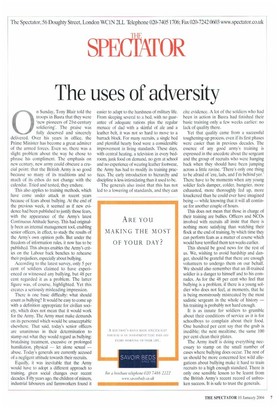The uses of adversity
0 n Sunday, Tony Blair told the troops in Basra that they were 'new pioneers of 21st-century soldiering'. The praise was fully deserved and sincerely delivered. Over his years in office, the Prime Minister has become a great admirer of the armed forces. Even so, there was a slight problem about the way he chose to phrase his compliment. The emphasis on new century, new army could obscure a crucial point: that the British Army is so good because so many of its traditions and so much of its ethos do not change with the calendar. Tried and tested, they endure.
This also applies to training methods, which have come under attack in recent years because of fears about bullying. At the end of the previous week, it seemed as if new evidence had been published to justify those fears, with the appearance of the Anny's latest Continuous Attitude Survey. This had originally been an internal management tool, enabling senior officers, in effect, to study the results of the Army's own opinion polls. But under the freedom of information rules, it now has to be published. This always enables the Army's critics on the Labour back benches to rehearse their prejudices, especially about bullying.
According to the latest survey, only 5 per cent of soldiers claimed to have experienced or witnessed any bullying, but 48 per cent regarded it as a problem. The latter figure was, of course, highlighted. Yet this creates a seriously misleading impression.
There is one basic difficulty: what should count as bullying? It would be easy to come up with a definition appropriate for civilian society, which does not mean that it would work for the Army. The Army must make demands on its personnel which would be unacceptable elsewhere. That said, today's senior officers are unanimous in their determination to stamp out what they would regard as bullying: brutalising treatment, excessive or prolonged humiliation, physical — let alone sexual — abuse. Today's generals are currently accused of a negligent attitude towards their recruits.
Equally, it was inevitable that the Army would have to adopt a different approach to training, given social changes over recent decades. Fifty years ago, the children of miners, industrial labourers and farmworkets found it easier to adapt to the harshness of military life. From sleeping several to a bed, with no guarantee of adequate rations plus the regular menace of dad with a skinful of ale and a leather belt, it was not so hard to move to a barrack block. For many recruits, a single bed and plentiful hearty food were a considerable improvement in living standards. These days, with central heating, a television in every bedroom, junk food on demand, no gm at school and no experience of wearing leather footwear, the Army has had to modify its training practices. The early introduction to hierarchy and discipline is less intimidating than it used to be.
The generals also insist that this has not led to a lowering of standards, and they can cite evidence. A lot of the soldiers who had been in action in Basra had finished their basic training only a few weeks earlier: no lack of quality there.
Yet that quality came from a successful toughening-up process, even if its first phases were easier than in previous decades. The essence of any good army's training is expressed in the anecdote about the sergeant and the group of recruits who were hanging back when they should have been jumping across a little ravine. 'There's only one thing to be afraid of 'ere, lads, and I'm behind yet.: There have to be moments when any young soldier feels damper, colder, hungrier, more exhausted, more thoroughly fed up, more knackered than he could ever have imagined being — while knowing that it will all continue for another couple of hours.
This does not mean that those in charge of their training are bullies, Officers and NCOs involved with recruits all insist that there is nothing more satisfying than watching their flock at the end of training, by which time they can perform feats as a matter of course which would have terrified them ten weeks earlier.
This should be good news for the rest of us. We, wishing to avoid hardship and danger, should be grateful that there are enough volunteers to undergo them on our behalf. We should also remember that an ill-trained soldier is a danger to himself and to his comrades. As for the 48 per cent who feel that bullying is a problem, if there is a young soldier who does not feel, at moments, that he is being monstrously mistreated by the most sadistic sergeant in the whole of history — his training is probably not hard enough.
It is as innate for soldiers to grumble about their conditions of service as it is for schoolboys to complain about their food. One hundred per cent say that the grub is inedible: the next mealtime, the same 100 per cent clean their plates.
The Army itself is doing everything necessary to stamp on the small number of cases where bullying does occur. The rest of us should be more concerned lest wild allegations about bullying make it hard to train recruits to a high enough standard. There is only one sensible lesson to be learnt from the British Army's recent record of unbroken success. It is safe to trust the generals.


























































 Previous page
Previous page